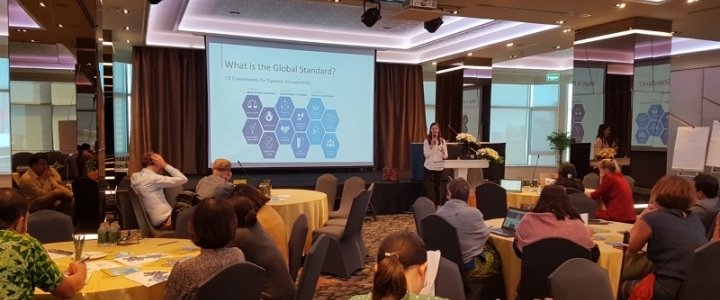
Jocelyn Condon presents at the Asia-Pacific regional partners’ meeting of the International Council of Voluntary Action (ICVA).
Reflections on the ICVA regional partners’ meeting
On 28 November 2019, ACFID’s Director of Development Effectiveness Jocelyn Condon, and Humanitarian Advisor Jen Clancy, presented a session on Civil Society Accountability to the Asia-Pacific regional partners’ meeting of the International Council of Voluntary Action (ICVA), which brings together humanitarian actors from across the Asia-Pacific region. We spoke with representatives at the conference about how their organisations are accountable, what this means, and how the Global Standard for CSO Accountability could improve the work of Civil Society Organisations worldwide.
Here’s some things we learnt along the way.
1. In the humanitarian context, accountability to affected populations has never been more important. We must prioritise creating space for this to happen.
If there’s one lesson that all our organisations have taken from the last few years, it’s how important it is to be accountable for the work that we do. This conversation is not new in the humanitarian space, and is formally driven through mechanisms such as the Core Humanitarian Standard, and the resolutions of the Grand Bargain, in particular stream 1 (greater transparency) and stream 6 (a participation revolution) (read more here).
Events of the #metoo era and scandals in the aid sector have left many in our sector feeling helpless in addressing the issues with our relief efforts. The tools employed in the Global Standard engage an organization in thinking about how to be an accountable and transparent organization at every opportunity and through every interaction with our stakeholders. We know it is not enough to simply have good intentions. What matters is how this translates to doing good in practice. The Grand Bargain reminds humanitarian organisations of the need to place the wishes of affected populations at the heart of a response. The Global Standard gives our organisations the practical tools we need to make sure this happens every time.
2. Arguably, for humanitarian organisations the most valuable thing about a Global Standard for CSO effectiveness is its relevance to all Civil Society actors engaging in a relief effort – be they international or domestic organisations.
The unique structure of the Global Standard and the different options for organisations to work with the standard offers a unique value proposition to the humanitarian response environment. Unlike pre-existing tools for accountability, the Global Standard puts all our organisations on a level playing field, setting out one framework of commitments and indicators to which all humanitarian responders can be held to account, and opening up the conversation for all organisations to be pro-active in defining and explaining what this would look like in their context. In the humanitarian sector, power differentials between large scale international response agencies and locally-led domestic organisations can often leave us feeling concerned about what it means to be truly accountable, and whether this is even possible. The Global Standard, however, enables organisations to both work on their own accountability, as well as to hold other organisations they interact with to account.
3. As humanitarian crises become increasingly protracted, using the Global Standard just makes sense
In a rapidly changing world that’s only just beginning to scratch the surface of the climate emergency, humanitarian work must also continuously adapt to the likelihood that our organisations will be working on a given response for much longer periods of time than ever before, and must become part of the ”fabric” of a country’s rebuilding. The time of “seasonal” extreme weather events happening in predictable patterns may well be behind us. Accordingly, we must abandon any assumption that humanitarian relief is a discrete intervention unrelated to the other work of civil society. As local organisations are increasingly taking on leadership roles in disaster relief operations, this is clearly no longer the case.
The Global Standard invites organisations to keep accountability and people-centred work front of mind right from the start and to keep it there, regardless of the exact type of work being undertaken, by whom or for how long. Using the Global Standard as a reference standard empowers our organisations to consider it a framework through which to customise and adopt a method accountability that is most relevant to the context of our work. Thus, the standard is relevant and important no matter the type of work a CSO undertakes, focusing on the organisation as the core point of accountability, and inviting our organisations to constantly adapt this accountability to be as effective in our work as we can.
ACFID is a partner to the Global Standard for CSO effectiveness, a global reference standard transforming civil society accountability. You can read more about ACFID’s partnership with the Global Standard here. Read more about the standard here.

Jocelyn Condon
Jocelyn Condon, Director of Development Effectiveness, ACFID
Jocelyn leads ACFID’s effectiveness and engagement team, which manages NGO membership, work under the ACFID Code of Conduct, and ACFID’s learning and innovation program. She has recently returned from four years in Timor-Leste where she worked with the International Labor Organisation, and is studying a masters of Development Policy at ANU. Prior to moving to Timor, Jocelyn worked as a Business Risk Consultant at Deloitte.








